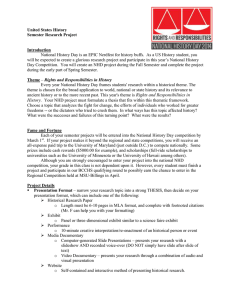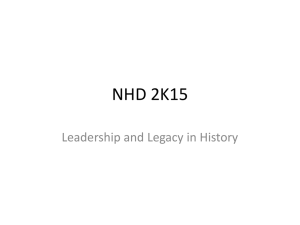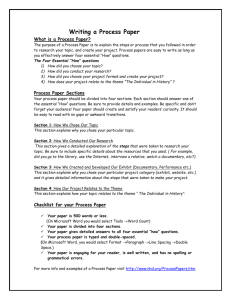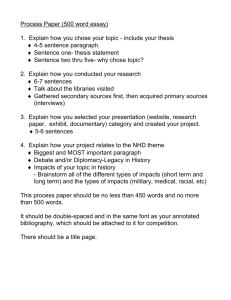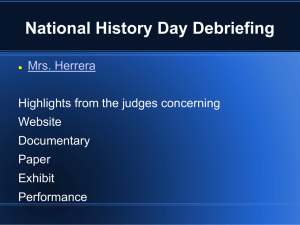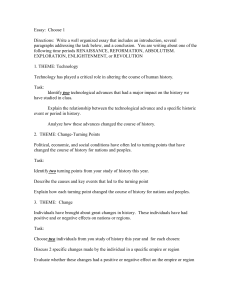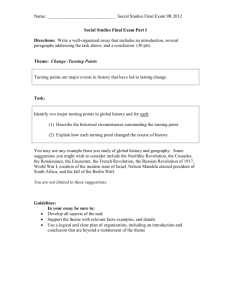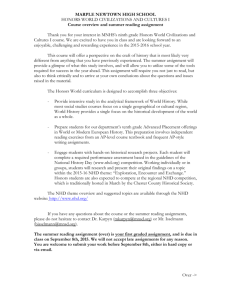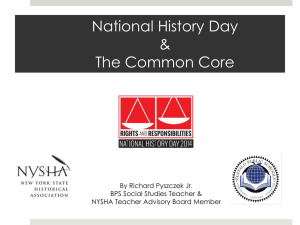National History Day
advertisement
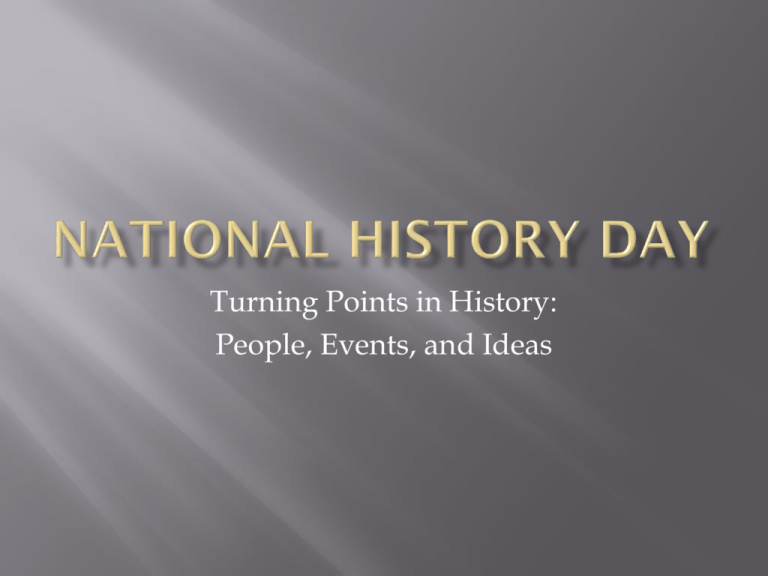
Turning Points in History: People, Events, and Ideas 2013 NHD Theme – “Turning Points in History: People, Ideas Events” Turning Point: •a point at which a significant change occurs • decisive change of direction •departure from long held tradition or rule •a point where history effectively turns a corner Climax Landmark Milestone 2013 NHD Theme – “Turning Points in History: People, Ideas Events” U.S. Government & War Supreme Court Decisions Sports Civil Rights Transportation Science & Technology 2013 NHD Theme – “Turning Points in History: People, Ideas Events” Turning Point: An event or set of events that, had it not happened as it did, would have prompted a different course in history. 2013 NHD Theme – “Turning Points in History: People, Ideas Events” Historical Context & Impact are crucial! What was happening before that led to pivotal change? What was the significance of the change? How will the change alter various aspects of society? Why did this change occur at this time and place? Second Sino-Japanese War U.S. enters WWII World War II begins between Axis and Allied powers Tension between Japan And Western powers Bombing of Pearl Harbor Atomic Bomb Submarine Warfare Iwo Jima 2013 NHD Theme – “Turning Points in History: People, Ideas Events” Events 1960 televised Presidential debate changes the role of media in the election process People *Should use at least 1 tag word Ideas Ghandi and his implementation of peaceful protest to achieve Indian Independence James “Crash” Ryan’s idea of seatbelts to improve car safety Turning Points should be historically significant Topics should be at least 20 years old Hurricane Katrina September 11, 2001 Your entry must include the following written material in the order presented below: 1. a title page 2. a process paper 3. an annotated bibliography A title page is required as the first page of written material in every category. Your title page must include only the title of your entry, your name(s), and the contest division and category in which you are entered. NOTE: The title page must not include any other information (pictures, graphics, borders, school name, or grade) except for that described in this rule. All categories except historical paper must include a process paper with the entry. It must describe in 500 words or less how you conducted your research and created your entry. The process paper must include four sections that explain: 1. how you chose your topic; 2. how you conducted your research; 3. how you selected your presentation category and created your project; and 4. how your project relates to the NHD theme. You can view sample process papers at www.nhd.org on the “Creating an Entry” page in the Contest section. An annotated bibliography is required for all categories. List the sources that contributed to the development of your entry, sources that provided usable information or new perspectives in preparing your entry. You likely will include fewer sources than you actually used. Sources of visual materials and oral interviews must be included. The annotations for each source must explain how you used the source and how it helped you understand your topic. For example: Bates, Daisy. The Long Shadow of Little Rock. New York: David McKay Co. Inc., 1962. Daisy Bates was the president of the Arkansas NAACP and the one who met and listened to the students each day. This firsthand account was very important to my paper because it made me more aware of the feelings of the people involved. There are five categories to choose from: 1. 2. 3. 4. 5. Documentary Exhibit Performance Website Paper Make your own documentary. Things to think about: Am I interested in using computers, cameras, and other technologies? Can I conduct and record interviews (for the purpose of including film clips in the documentary)? Can I find film clips to use in my documentary? Are there enough still photographs related to my topic and that I can use in my documentary? Do I have access to equipment that will be needed to make a documentary? Is creating a documentary the best way to show off my topic? The exhibit category is three dimensional and is displayed on a physical structure. Exhibits use color, images, documents, objects, graphics, and design, as well as words, to tell your story. Exhibits can be interactive experiences by asking viewers to play music, solve a puzzle, look at a video, or open a door or window to see more documents or photos. The performance category is the only one that is presented live. Developing a strong narrative that allows your subject to unfold in a dramatic and visually interesting way is important. Memorizing, rehearsing, and refining your script is essential, so you should schedule time for this in addition to research, writing, costuming and prop gathering. Create your own website about your topic. You must use the NHD web generator for it to be a valid entry. You need access to the internet and a computer. • Write a research paper A paper is a highly personal and individual effort, and if you prefer to work alone this may be the category for you. Papers depend almost entirely on words to tell the story, and you can usually include more information in a paper than in some of the other categories. Do not work with friends Local issues and history are more likely to move on. You cannot work with a student whom is not in your period. Meet the bench mark deadlines. No groups over three people. You must have your topic selected by Dec. 10th (It can not be changed.)

